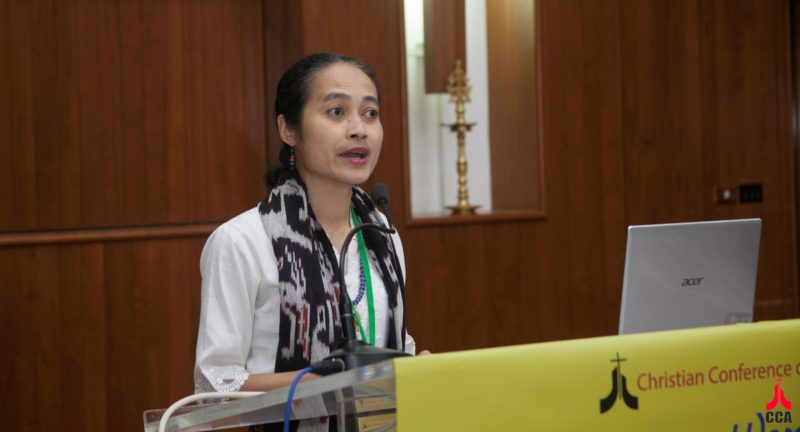God is the ‘weaver’ who works to restore the integrity of creation, says Indonesian woman theologian
 Rev Irene Umbu Lolo, a woman theologian from Indonesia, speaking on 'Be Awake to Restore' at AEWA
Rev Irene Umbu Lolo, a woman theologian from Indonesia, speaking on 'Be Awake to Restore' at AEWA
HSINCHU, Taiwan: “God is the ‘weaver’ who actively works and continues to create for the restoration of relations and the integrity of all creation,” said Rev Irene Umbu Lolo, a young woman theologian from Indonesia’s far-flung and remote Sumba region.
Addressing the participants of the first-ever major ecumenical women’s gathering, the Asian Ecumenical Women’s Assembly (AEWA), Rev Irene, in the fourth thematic plenary session on the fifth day spoke on the sub-theme, ‘Be Awake to Restore’.
The fierce woman theologian and lecturer of feminist theology drew parallels between the experiences of women weavers in her native Sumba and the restorative actions of God.
“The patriarchal social and cultural systems put men in primary positions with special rights as owners and leaders, while women are categorised as second-class citizens and their lives are controlled by men. However, Sumba’s women weavers respond to these violences with non-violence, and resist in a conciliatory manner. They have proved that they are problem-solvers and peacemakers,” explained Rev Irene.
In her presentation, Rev Irene elucidated the symbolism and meaning of weaving as a restorative process. “For Sumba, weaving is the process which entails empowering those who are part of it to restore their communities, restore nature, and restore their own inner peace.” The act of collective creation, she said, was vital to the process of peaceful restoration.
Jiji Johnson from the Malankara Orthodox Syrian Church in India observed that this was a healthy process where socially negative responses were channeled by creative works in socially positive and helpful responses. This sort of creative act resulted in personal healing and collective rehabilitation with beneficial consequences for all involved.
Rev Hyomyong Lim from Korean Methodist Church wondered if the meaning, symbolism, and interpretation of the weavers’ motifs and colours were shared in other places of Asia as well.
Sirirat Pusurinkhum from the Church of Christ in Thailand described her own experiences in the Thai context and added that weaving was a part of the locals’ lives, which aided in the healing of memories and reparation of histories. This was a phenomenon that occurred not just in one day, but over time; just as in the context of restoration which happens gradually and is facilitated by the active and dynamic working of the Holy Spirit.
AEWA, an Asian ecumenical women’s gathering is being held around the theme, ‘Arise, Be Awake to Reconcile, Renew, and Restore the Creation’. Around 250 participants representing Christian denominations from across Asia as well as officers from international ecumenical organisations are attending the week-long event at Taiwan’s techno-city, Hsinchu.










